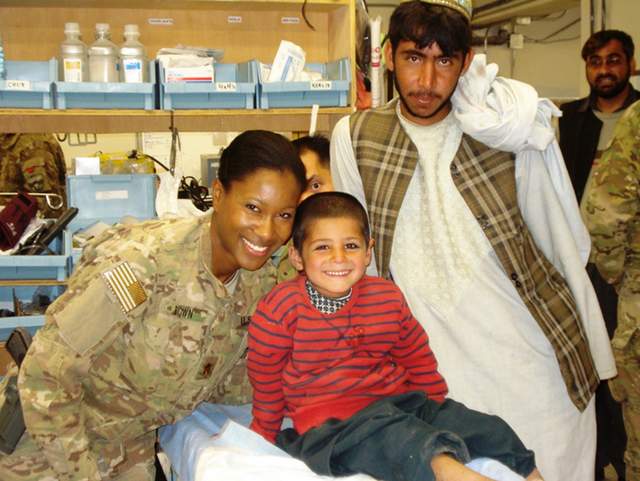
The Tarin Kowt district of Afghanistan is mired in poverty, wracked by warfare, and beset by a host of concerns such as lack of available medical care.
Lt. Cmdr. Leah Brown helped to alleviate some of that medical care shortage by providing direct patient-centered care to the local population during her time recently deployed with Combined Joint Special Operations Task Force – Afghanistan.
Brown, an orthopedic doctor at Naval Hospital Bremerton received the Army Bronze Star for her humanitarian efforts when she was assigned to the Role 2 hospital in Tarin Kowt Forward Operating Base, located in the southeast Uruzgan province from Oct. 2012 to May 2013.
“I was part of a medical team utilized by special operations and we took on a humanitarian assistance role to visit the local hospital which served the entire province. They had a very large catchment area. It is also one of the poorest regions as well as a very traditional area that really needed dedicated medical support,” said Brown, an Atlanta, Ga. native who attended Benjamin E. Mays High School and the University of Georgia for her undergraduate work, before going to Ohio State University and the Cleveland Clinic Foundation for medical school prior to her 10- year-stint in the Navy.
Brown noted that as part of the Role 2 hospital’s medical team, she conducted orthopedic surgeries that the local doctors couldn’t handle, as well as provided orthopedic care to many local children and men. She made such a positive impact, she even started treating women.
“Being able to treat Afghan women was a very big deal due to their rigid beliefs rooted in old ways. It was a huge turnaround and a big accomplishment,” Brown said, adding that as part of an all-female team, they made a positive impression in providing health and wellness care.
The local hospital itself had seen better days. Three decades of war had depleted skilled medical workers, what supplies were to be had, and there was a limited infrastructure, not only in the hospital but throughout the region.
“The hospital staff was limited due to the constant danger and there were simply not a lot of resources. It was also frustrating to see so much poverty and what the prolonged war had done to the country. In conversation with our translators, they would share about how it used to be. It’s sad,” Brown said.
“It was vastly different. … We did mid-wife training for a group of 14-15 year old girls, who were essentially the only providers available for women there. The main concern for medical attention for women was it was just mainly required during the birthing process,” explained Brown.
Along with being smack in a war zone and trying to deliver medical care to a populace in need, there were constant logistical, location and logical issues to handle and try to comprehend on a daily basis.
Local children finding improvised explosive devices and unexploded ordnance were a constant theme. Another local child found ordnance and the resulting blast caused a huge skull defect.
“The child’s father had cared for him, but we took him in and immediately provided emergency care. With treatment and therapy the young child went from being bedridden to using a walker to zooming around our area,” remembered Brown. “It was case by case consideration, but that’s an example of doing all we can.”
Brown’s efforts did get noticed internally and she was awarded the Army Bronze Star.
“Practice medicine with the total altruistic reason that got you into the field in the first place. You get what you get and you provide what you can, even if it’s just a band-aid or pair of crutches with a smile,” Brown said.
